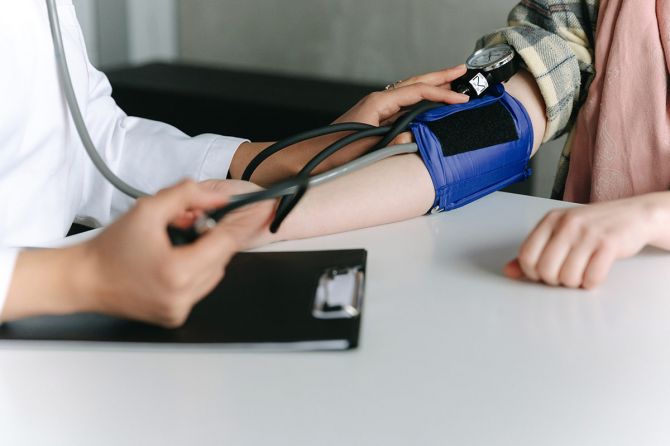One may be at a risk of heart attack or stroke even months after recovery, cautionss Dr Ruchit Shah, interventional cardiologist, Masina Hospital, Mumbai.

Not just lungs, the pandemic has had far reaching side effects on the human heart, kidneys and brain.
In the last two years, it has been observed that patients who have pre-existing heart disease are at a very high risk of succumbing to Covid.
A weak heart is not able to cope up with the demands of the body when the virus strikes.
Similarly, patients who do not have any pre-existing illnesses also tend to develop heart problems when they contract COVID-19.
It is important to understand that 25% of hospitalised Covid patients have been diagnosed with cardiovascular complications and this contributes to more than 40% of Covid related deaths.
Recently researchers conducted a study where they took MRI of 100 patients who have recovered from Covid and did not have any pre-existing conditions. Out of this, 78% of these patients had abnormalities in the heart and 60% patients had inflammation in the heart.
This means most of the patients who developed COVID-19 had some form of myocardial injury or heart injury even if they did not have any pre-existing heart problems.
The novel coronavirus affects the ACE2 receptor on the heart and the inner surface of arteries which leads to formation of clots. Once clots develop, there is a higher chance of heart attacks.
Therefore, it is important to keep in mind the following tips in order to take care of your cardiac health:
1. Know the state of your heart
Several studies have indicated that patients who have recovered from COVID-19 have shown symptoms of breathlessness, fatigue and tiredness lasting a few months.
This might be due to heart issues which may or may not have been diagnosed earlier.
A 2D echocardiography would be helpful to determine the health and state of your heart as an initial screening test.
2. Vaccination is a must
Vaccines are like seat belts.
Seat belts do not prevent accidents but protect the user from maximum damage in the event of an accident.
Similarly vaccines don't guarantee to prevent Covid but reduce the intensity of the infection and impact on a vaccinated person
3. Don't ignore the symptoms
A patient might be asymptomatic for Covid but may be easily exhausted, and tired.
S/he may exhibit quick fatigue, inability to sleep well due to exertion and breathlessness, palpitations, dizziness, and loss of consciousness.
If you experience any of the symptoms, please consult your doctor at the earliest.
4. Learn CPR (Cardiopulmonary Resuscitation)
If a person collapses in front of you, as a bystander you should should initiate chest pumping at the rate of 100 pushes per minute till medical help arrives.
This is an essential skill that can help save lives.
However, mouth to mouth breathing or resurrection should be avoided and is not recommended in present times.
5. Masking and sanitisation
Precaution is always better than cure.
Whether you are fully vaccinated or have recovered from Covid, don't let your guard down.
Masking and sanitisation are essential to keep you and the people around you safe.
6. Consult an expert and maintain cardiac health
Covid can pose a threat to the heart any time.
Covid may result in reduction of the heart pumping capacity due to inflammation of the heart commonly known as myocarditis.
It also precipitates a heart attack and heart failure. If ignored or not taken care of, it may even affect a perfectly normal heart and the after effects can last up to a few months.
If you have recently recovered from the virus, it is important to consult your cardiologist who may suggest timely diagnosis of symptoms and prescribe appropriate medication.
Before subscribing to any medication, do check with the expert to warn you about the possible side effects.
7. Prevent clotting risk
Covid increases the coagulation of blood which means you may have clotting complications post Covid even after a mild infection.
One may be at a risk of heart attack or stroke even months after recovery. It is wise to consult a cardiologist who is authorised to give you blood thinners that can prevent these complications.
8. Maintain a healthy lifestyle
Post your Covid recovery it is important to consume a healthy and balanced diet.
The World Health Organization recommends consuming fruits, vegetables, whole grains, legumes, and nuts for a healthy heart.
You must stay away from excessively salty meals and packaged products which have high sodium content.
Avoid munching processed food like chips, canned products. Have loads of fresh fruits instead of mithai and cookies.
While doctors do not advise you to start rigorous exercise after recovering from Covid, it is important to stay active.
You can start with little physical activity, and gradually increase it as your stamina increases and health improves.
Walk regularly, do appropriate asanas and pranayama for good health.
Avoid tobacco and alcohol if you want your heart to be healthy in long term.
The consumption of alcohol can increase your chances of getting cardiovascular disease.
Similarly, the harmful toxins in cigarettes can damage the heart and blood vessels and can lead to heart attacks and strokes.
9. Control your blood pressure and blood sugar levels
High blood pressure is known to be a silent killer. It affects your heart without exhibiting any major symptoms.
Diabetes can also affect your blood vessels and nerves that control your heart.
It's better to keep these villains in check.
10. Reduces oxidative stress
Oxidation is a natural process where the free radicals in your body fight off pathogens and infections to keep you healthy.
When there is an imbalance between free radicals and anti-oxidants, it causes oxidative stress which affects normal functioning of the body and damages the arteries of the heart.
If your diet is high in sugar, salt, fats and/or alcohol, it can cause oxidative stress.
While it may be impossible to completely avoid oxidative stress, you may consult a nutritionist or expert who can guide you on a healthy diet and lifestyle to minimise the effect of oxidative stress.
These are just a few steps to take better care of your heart.
If you have a pre-existing heart condition is important to stay in touch with your physician, pulmonologist or cardiologist who can address issues of the heart and offer appropriate medical intervention.












 © 2025
© 2025